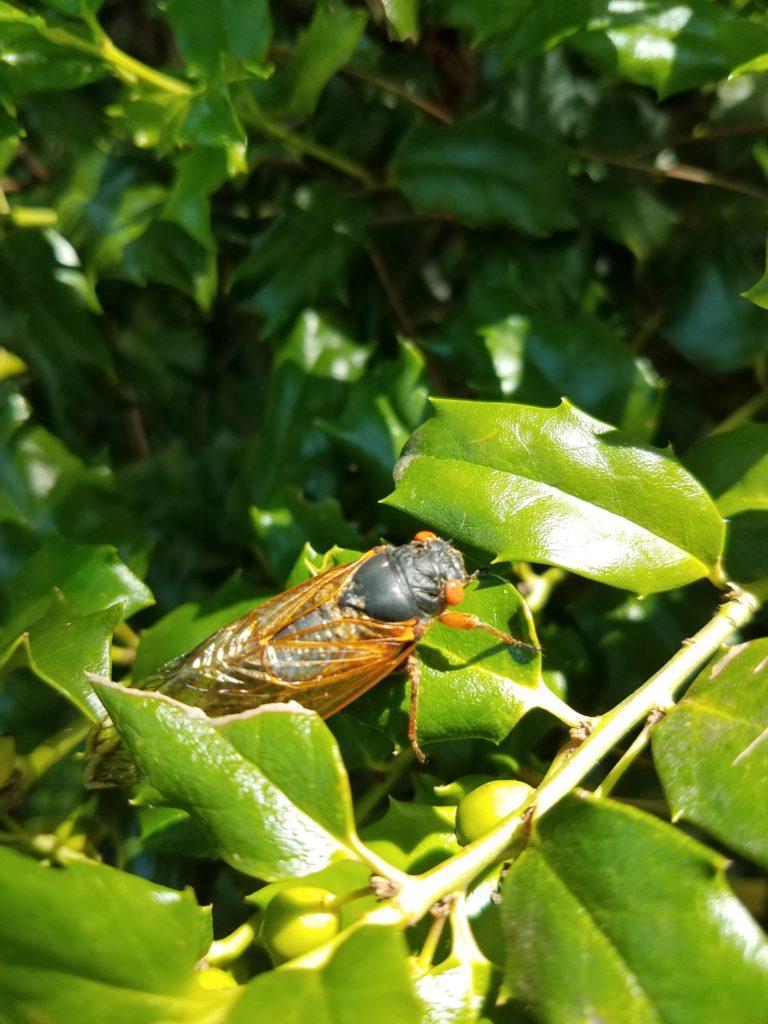I live in one of the fifteen states where Brood X (that’s Roman numeral X), the largest brood of periodical cicadas, has graced us with its presence this summer. Following a weirdly accurate inner clock, these insects emerge from the soil every seventeen years, live it up for maybe four to six weeks, and then die, leaving a new brood to burrow beneath the ground until it’s time to repeat the cycle.

The first cicada invasion I recall happened during the summer of 1987. I was clerking for a law firm, grabbing quick lunches with a law-school friend who clerked at another firm nearby. Wherever we walked, cicada exoskeletons crunched beneath our feet. For my friend, a bona fide bug-phobic, this was a dystopian nightmare come to life. We had to stop every few feet so that she could get the “Ew!” out of her system. Despite her horror, we laughed all through that unusual summer. We were both pregnant, and the double bond of law school and impending motherhood cemented our friendship. By the end of the summer, we knew that our unborn babies would be best friends, good students, happy children. Standing on the cusp of so much possibility, the idea that our babies would be in high school when Brood X next arrived seemed unreal…
…but they were. During the 2004 invasion, my friend and I were relieved that our Brood X babies were not high-school seniors. The choice for graduating seniors that year was bleak: they could either adhere to tradition and hold graduation outside (amid dive-bombing cicadas, dead-bug stink, and incessant percussive noise) or move the ceremony into the more prosaic cement-block gym. Quite a bit had changed for my friend and me since Brood X’s last visit. Our 1987-88 babies had been joined by siblings. Neither of us still practiced law. My family had moved to a different house. Our cicada-girls no longer attended the same school, which meant less daily contact for us after nearly fifteen years of practically living in each other’s homes. We still shared a life-track, though. We were moms with kids juggling hectic academic and extra-curricular schedules. The college search was waiting to pounce. We remained keepers of each other’s memories. It was fun to reminisce about where we’d been that summer seventeen years earlier and to ponder what life might look like when the cicadas next dug themselves out of the earth in 2021. Our girls would be in their early 30s (impossible!), their journeys to and through college a thing of the past. There might be careers, romantic partners, maybe even kids.
The 2021 brood finds me in the same house as the 2004 generation did, but life is inevitably different. My home is emptier, quieter. My girls moved away long ago; my 1987 baby has a baby of her own, a child also born during a cicada year. I imagine that she, too, will study her little one and wonder what this baby will be like when Brood X returns in 2038. My friend is gone. She passed away over seven years ago, taking with her not only her own memories but part of mine as well. Her cicada-baby, such a vibrant part of my life for so many years, has drifted from my orbit. I think of her even more during the cicada summers that remind me of her mom. This year, the appearance of Brood X doesn’t involve conversations that start with “Remember when …?” and end with “I wonder where the girls will be next time?” A lot happens while the cicadas sleep.
The cicadas no longer remind me of events that occur in seventeen-year intervals. They remind me instead of what has happened in-between.
This time, I’m not entertaining thoughts about what my life might be in 2038. It feels too scary, like a cosmic game of Russian Roulette. Instead I’m remembering that cicadas symbolize rebirth and transformation. They aerate the soil as they emerge, allowing air, water, and nutrients to penetrate. They enrich the earth with nitrogen as they depart, leaving a richer medium more open to growth. Memories do the same for the heart, and we don’t have to wait every seventeen years to hold them close. But just in case we get too busy to remember this, it’s nice to have a periodic reminder.








Life goes on, in many modes. A beautifully composed reflection.
Exactly! Such interesting little life markers, aren’t they! Beautifully written!
Looking out my back doors and thinking to myself that I don’t remember there being as many seventeen years ago. There must be hundreds in our trees in the back yard. Anyway, I really enjoyed reading your article.
Beautiful… wouldn’t of expected anything different!
Hope all is well, enough..
This is so beautiful Jill. Another way to think about changes and family
Beautiful heartfelt memories!
So eloquently written!
Time marches on!
I would love to hear everyone else’s cicada-inspired stories, too! Thank you so much for taking the time to read and respond. It’s appreciated!
“A lot happens while the cicadas sleep”…. indeed!
Allison Bechdel’s memoir FUN HOME includes a section on a cicada summer in her childhood that was vivid and important and almost too narratively perfect. She said she’s glad she kept a journal, or she wouldn’t have trusted her own memory.
The cicadas sort of defy memory. They’re intensely present for a condensed amount of time, and then they’re …gone. It’s hard to believe they ever happened at all. They’re the Brigadoon of the insect world.